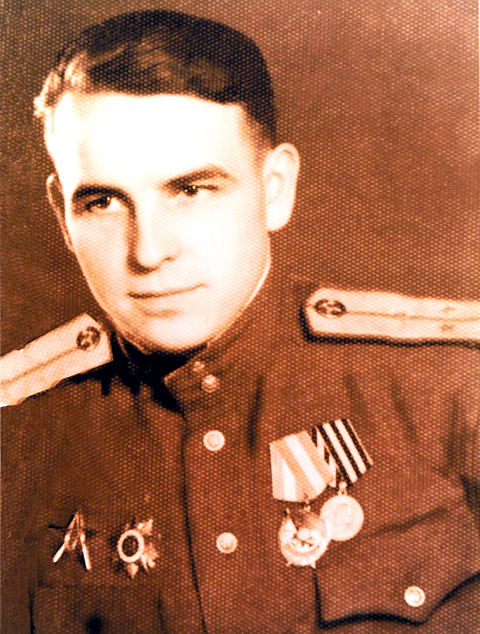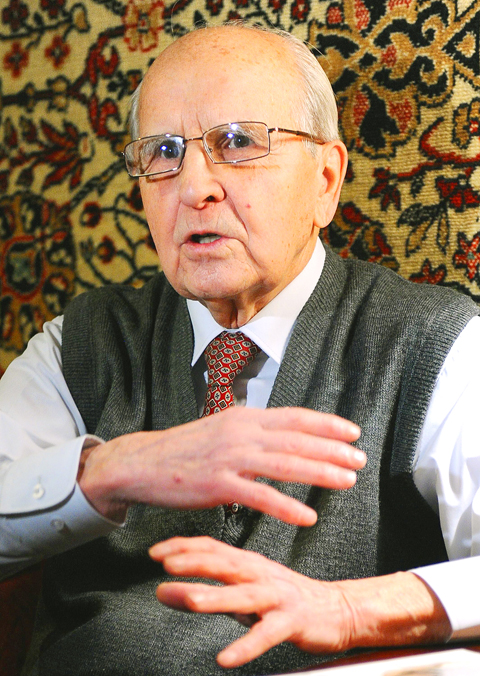Until the last, Ivan Martynushkin knew nothing of the horrors his unit would uncover when the Soviet army fought its way to the barbed wire fences of Auschwitz — Nazi Germany’s most infamous death camp.
Sixty-five years on, he is still haunted by what he saw — memories that have only grown more terrible as he learned the camp’s story.
Some 1.1 million people died at the camp between 1940 and 1945 — 1 million of them Jews from across Nazi-occupied Europe. Some died from overwork and starvation, but most were murdered in the gas chambers.

PHOTO: AFP
“I will remember those things until the end of my days,” the 86-year-old veteran, who headed a gunner unit of the Red Army’s 322nd rifle division that liberated Auschwitz, said in interview at his home in Moscow.
The sprightly, gray-haired veteran sat in his neat apartment surrounded by books and photographs, including one of him with Russian Prime Minister Vladimir Putin. A jacket pinned with war medals hung on the wall.
Martynushkin said it was only when he saw the camp’s barbed wires and his commander ordered the troops to hold their fire that he “guessed that this was some special military zone, that this was something else.”

PHOTO: AFP
For many veterans, the lack of shooting on that day — Jan. 27, 1945 — in the midst of the fiercest weeks of fighting, remains one of their most powerful impressions, Holocaust researcher Ilya Altman said.
Martynushkin recalled the ghostly quiet and acrid “ash-and smoke-filled” air at Auschwitz.
He had seen other Nazi prisoner camps, but as his unit moved along the perimeter of Auschwitz he was staggered.
“It was huge. It went on and on for kilometers,” he remembered. “We started to see groups of people when we reached the fence. They came up to us dressed in prison stripes, some had other clothes on top.”
“After being in such a hell, constantly threatened by death, they were worn, depleted people. The only thing to them were those eyes that reflected a kind of joy — of being freed, the joy that hell had ended and they remained alive,” he said.
As the Soviet troops closed in, 60,000 prisoners had been driven back behind the Nazi lines in a forced “death march” that would be remembered by the survivors as worse than all that had come earlier at the camp.
The few thousands left behind were thought too weak to march, but by some luck escaped being shot in the chaos of the rushed exodus.
Martynushkin turned 21 just days before arriving at Auschwitz, but by that time he had already spent three years at the front.
Desensitized by the scale of suffering he witnessed over the war, he did not realize the full horror of the death camp, he said.
It was only later, when the Nuremberg trials began, that he came to understand what had previously seemed unimaginable.
“Back then when we saw the ovens, our first thought was: ‘Oh well, so they are crematoriums. So people died and they didn’t bury them all,’” he said. “We didn’t know then that those ovens were specially built for the killing of people, to burn those who had been gassed, that kind of systematic killing.”
Auschwitz operated from 1940, a year after the German invasion of Poland. Its victims also included 85,000 non-Jewish Poles, 20,000 gypsies, 12,000 non-Jewish other European nationals and about 15,000 Soviet prisoners of war.
“It was unlike any other war. It was a war over the existence of entire peoples,” Martynushkin said. “We were able to see this plan at Auschwitz. Everyone was there, representatives of all the European nations.”
He was planning to travel to Poland with a handful of other surviving Soviet soldiers for the 65th anniversary tomorrow of the day they liberated Auschwitz.

‘TERRORIST ATTACK’: The convoy of Brigadier General Hamdi Shukri resulted in the ‘martyrdom of five of our armed forces,’ the Presidential Leadership Council said A blast targeting the convoy of a Saudi Arabian-backed armed group killed five in Yemen’s southern city of Aden and injured the commander of the government-allied unit, officials said on Wednesday. “The treacherous terrorist attack targeting the convoy of Brigadier General Hamdi Shukri, commander of the Second Giants Brigade, resulted in the martyrdom of five of our armed forces heroes and the injury of three others,” Yemen’s Saudi Arabia-backed Presidential Leadership Council said in a statement published by Yemeni news agency Saba. A security source told reporters that a car bomb on the side of the road in the Ja’awla area in

PRECARIOUS RELATIONS: Commentators in Saudi Arabia accuse the UAE of growing too bold, backing forces at odds with Saudi interests in various conflicts A Saudi Arabian media campaign targeting the United Arab Emirates (UAE) has deepened the Gulf’s worst row in years, stoking fears of a damaging fall-out in the financial heart of the Middle East. Fiery accusations of rights abuses and betrayal have circulated for weeks in state-run and social media after a brief conflict in Yemen, where Saudi airstrikes quelled an offensive by UAE-backed separatists. The United Arab Emirates is “investing in chaos and supporting secessionists” from Libya to Yemen and the Horn of Africa, Saudi Arabia’s al-Ekhbariya TV charged in a report this week. Such invective has been unheard of

‘SHOCK TACTIC’: The dismissal of Yang mirrors past cases such as Jang Song-thaek, Kim’s uncle, who was executed after being accused of plotting to overthrow his nephew North Korean leader Kim Jong-un has fired his vice premier, compared him to a goat and railed against “incompetent” officials, state media reported yesterday, in a rare and very public broadside against apparatchiks at the opening of a critical factory. Vice Premier Yang Sung-ho was sacked “on the spot,” the state-run Korean Central News Agency said, in a speech in which Kim attacked “irresponsible, rude and incompetent leading officials.” “Please, comrade vice premier, resign by yourself when you can do it on your own before it is too late,” Kim reportedly said. “He is ineligible for an important duty. Put simply, it was

US President Donald Trump on Saturday warned Canada that if it concludes a trade deal with China, he would impose a 100 percent tariff on all goods coming over the border. Relations between the US and its northern neighbor have been rocky since Trump returned to the White House a year ago, with spats over trade and Canadian Prime Minister Mark Carney decrying a “rupture” in the US-led global order. During a visit to Beijing earlier this month, Carney hailed a “new strategic partnership” with China that resulted in a “preliminary, but landmark trade agreement” to reduce tariffs — but